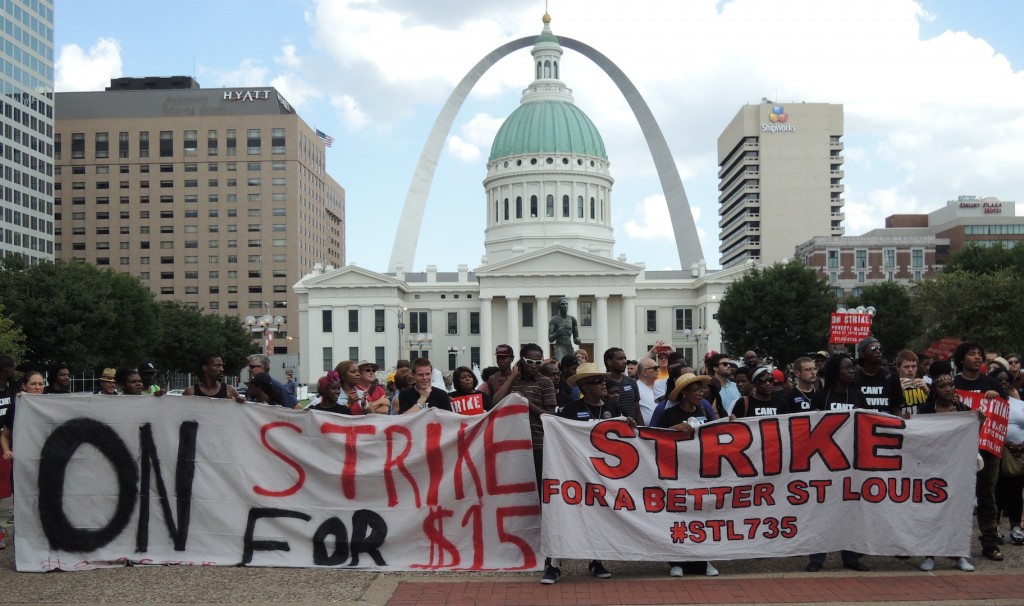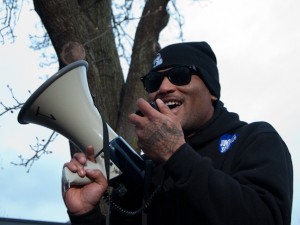
– Labor Tribune file photo
FAST FOOD VICTORIES, PART 1
By TIM ROWDEN
Editor
More than a year has passed since St. Louis fast food workers joined forces with thousands of low-wage workers across the country who walked off their jobs to demand better wages, fair treatment on the job and the right to organize without retaliation.
Their efforts have helped fuel the national debate over income inequality and shone a light the need to raise the minimum wage.
Their bravery and persistence is having an impact.
• Seattle Mayor Ed Murray signed legislation raising the city’s minimum wage to $15 an hour.
• McDonald’s CEO Don Thompson recently suggested his company would support a bill, proposed by President Barack Obama, raising the federal minimum wage to $10.10 an hour.
• Last month, the heads of two fast food companies came out in favor of an increase.
Subway CEO Fred Deluca said he was “not concerned” by the idea of federal minimum wage increase, since it would affect rivals companies just the same, and Dairy Queen’s CEO John Gainor said “People need to paid a fair wage.”
“It takes a lot of time to train people,” Gainor said in an interview with CNN. “You want to make sure you’re paying a very good wage, otherwise you have a lot of turnover.”
LOCAL IMPACT
The local workers, organized as Show Me 15, have staged numerous marches, strikes and rallies, and they are starting to see results.
• After the first wave of strikes last July, a Popeye’s worker was taken off the schedule by the general manager. Forty workers and community members, including a county elected official, rallied at the store, prompting the owner to come out, shake the worker’s hand and welcome him back to work.
• A Jimmy John’s employee secured a raise of $2 an hour and raises of 75 cents or higher for her co-workers.
• At two stores – a Jimmy John’s and an Arby’s – Show Me 15, coordinated by the St. Louis Organizing Committee, filed and won two Unfair Labor Practices (ULP) complaints over management’s treatment of workers.
• At the Soulard Jimmy John’s on S. Broadway, a manager who made a practice of publicly humiliating employees was removed from his store.
‘MOTIVATION AND COURAGE’

Chaz Williams, 27, who works at a Sonic in north St. Louis County, went out in that first strike wave after he became frustrated with a manager who didn’t appreciate his hard work and frequently criticized him or tasks he knew he had completed correctly. He was the only one in his store to walk out.
That simple act made clear to the manager how much work he was doing, and how much she needed him in the store.
“She called me every day asking me to come back to work,” Williams said. “That’s how you show you’re important to a corporation. I had to walk out. She apologized and gave me a 50-cent raise.”
Williams has worked in fast food since he was 15. He lives with his mother because he can’t afford a place of his own. He helps his mother with the household bills and also supports a daughter.
“The movement gave me motivation and courage,” he said. “They told me that you have a voice. They told me how to do it the right way, and that’s how I did it.”
‘ONLY THING AVAILABLE’
At an Arby’s on Lindell, 28-year-old Brittany Scott, a front line worker who, like her co-workers was regularly bullied and demeaned by her manager, was ordered to stop talking to talking to her fellow workers about the movement. As a result of the ULP complaint, Arby’s now has a policy that management must tell all new employees they have the right to organize without retaliation.
“We are allowed to organize now in our store,” Scott said. “I’m getting treated with more respect by the managers. I’m getting more hours, and I’m getting to work more overtime, which is a plus for me.”
Scott has a degree in criminal justice, but couldn’t find work in her field when she graduated four years ago. That’s how she would up in fast food.
She lives with her mother, and gives half of each check to her for rent and bills.
“I turned to fast food because it’s the only thing available,” she said
‘WE’RE GOING TO GET THINGS DONE’
Shnette Hooker, a 43-year-old McDonald’s worker with Crohn’s disease, a condition her employer knew about when she was hired, found her hours being cut after she became involved in the movement.
Starting in mid-December, her employer cut 10 hours a week from her schedule until she wasn’t working at all. She called the store each day but was told she had been placed on medical leave. McDonald’s doesn’t have medical leave for frontline workers.
After several members of Show Me 15 went with her to the store to meet with the manager and owner, Hooker was placed back on the schedule and a new manager was assigned to the store. She now gets about 21 hours a week at $7.50 an hour.
Hooker, a mother of three – 17, 18 and 25 – is on partial disability because of her condition. Unable to come up with enough money to pay the family’s bills during the six-and-a-half weeks that her hours were being cut, they were forced to move in with her mother. She’s saving now, hoping to get out on her own again.
“The only reason I went back to work in the first place is I don’t want to live on disability all my life.
“There were a lot of people that were being treated unfair,” Hooker said of her original motivation to walk out. “When you stand up, you’re more than one person; it’s more than you. There are things you can do. If you get taken of the schedule and things like that, we’re going to march back up there. As an organization, as a union, we’re going to get things done.”
(Next up: A look at fast food worker successes across the country.)

